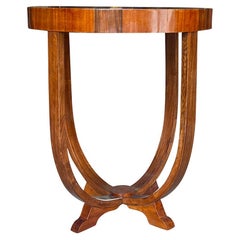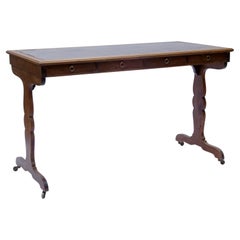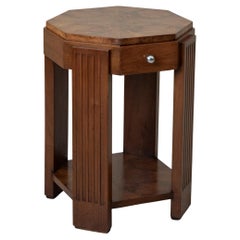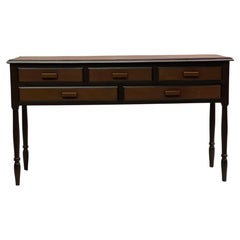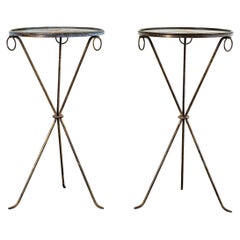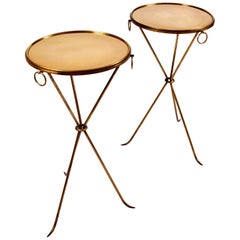Jean-Michel Frank Side Tables
For French interior and furniture designer Jean-Michel Frank (1895–1941), history always had a great allure. He once wrote, “The noble frames that came to us from the past can receive today’s creations.” His career celebrated heritage while promoting new modes of 20th-century design, and it flourished between the World Wars when Frank designed interiors that tastefully mixed extravagance with sophisticated simplicity, often featuring pieces he made with his business partner, cabinetmaker Adolphe Chanaux.
It took personal tragedy for Frank to realize his calling. Frank had been exempted from the World War I draft due to his physical frailty but his brothers both served and died on the front. When his German father applied for French naturalization, he was rejected and placed under house arrest, killing himself shortly after. His mother went into a deep depression and began undergoing psychiatric treatment and died a few years later.
With his large inheritance, Frank joined the Paris culture crowd and there got his start in the burgeoning field of interior design. His signature style, which became known as “luxe pauvre” — “impoverished luxury” — was characterized by clean lines, mixed materials and hard-to-miss details. His interiors for clients including Nelson Rockefeller and Elsa Schiaparelli featured artwork by modern creators like Diego and Alberto Giacometti, Pablo Picasso and Henri Matisse. Favoring the color white, he would consider each element of his spartan rooms as part of the whole, from bronze doors to plush antique furnishings, always tastefully rich yet never decadent. He worked on furniture with Chanaux that reinforced this austere style. Some of his most well-known furniture pieces, including the Croisillon table lamps, the Parsons table, brass tripod gueridons and the leather Comfortable chairs that used the Hermès saddle stitch, are extremely simple in their elegant appearance. This attention to refined details, simple luxury and the cohesion of design in a room made him one of the leading tastemakers of 1930s Paris.
After fleeing the Nazi occupation of France (he was part of a Jewish family that included his distant cousin, the diarist Anne Frank), Frank arrived in New York where he killed himself at the age of 46. His commitment to creating home interiors where comfort and fine art could merge and styles could mix in harmony remains influential in design.
Browse Jean-Michel Frank furniture on 1stDibs.
Early 20th Century French Art Deco Jean-Michel Frank Side Tables
Mahogany
1930s Argentine Art Deco Vintage Jean-Michel Frank Side Tables
Leather, Oak
Early 20th Century French Art Deco Jean-Michel Frank Side Tables
Chrome
Mid-20th Century French Mid-Century Modern Jean-Michel Frank Side Tables
Leather, Hardwood
20th Century French Louis XV Jean-Michel Frank Side Tables
Walnut
21st Century and Contemporary Argentine Mid-Century Modern Jean-Michel Frank Side Tables
Iron
1970s American Mid-Century Modern Vintage Jean-Michel Frank Side Tables
Brass
21st Century and Contemporary American Modern Jean-Michel Frank Side Tables
Metal, Bronze
21st Century and Contemporary Argentine Mid-Century Modern Jean-Michel Frank Side Tables
Stone, Iron
1810s English Antique Jean-Michel Frank Side Tables
Brass
20th Century French Louis XV Jean-Michel Frank Side Tables
Brass
Early 20th Century French Jean-Michel Frank Side Tables
Walnut
Late 20th Century European Jean-Michel Frank Side Tables
Mahogany
2010s Ukrainian Post-Modern Jean-Michel Frank Side Tables
Steel
1930s Argentine Art Deco Vintage Jean-Michel Frank Side Tables
Brass
1930s Argentine Vintage Jean-Michel Frank Side Tables
Bronze
Jean-michel Frank side tables for sale on 1stDibs.
- 1stDibs ExpertApril 5, 2022You can see Jean-Michel Basquiat paintings in a number of locations. Some of his work is in the collections of the Museum of Contemporary Art in Los Angeles, California, and The Museum of Modern Art in New York, New York. On 1stDibs, find a selection of Jean-Michel Basquiat.
- 1stDibs ExpertApril 5, 2022The meaning of Jean-Michel Basquiat's art varied from piece to piece. Generally, the American artist attempted to illustrate dichotomies, such as the experience of the wealthy versus the experience of the poor and the inner self versus the outer self. On 1stDibs, shop a range of Jean-Michel Basquiat art.
